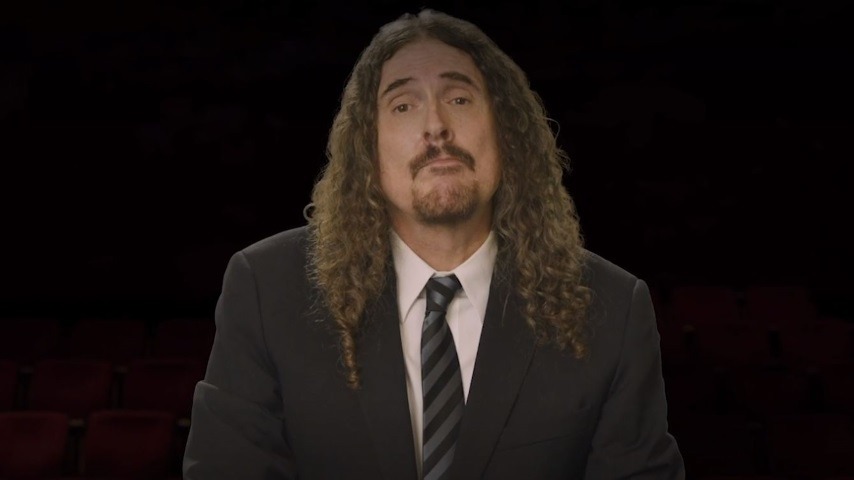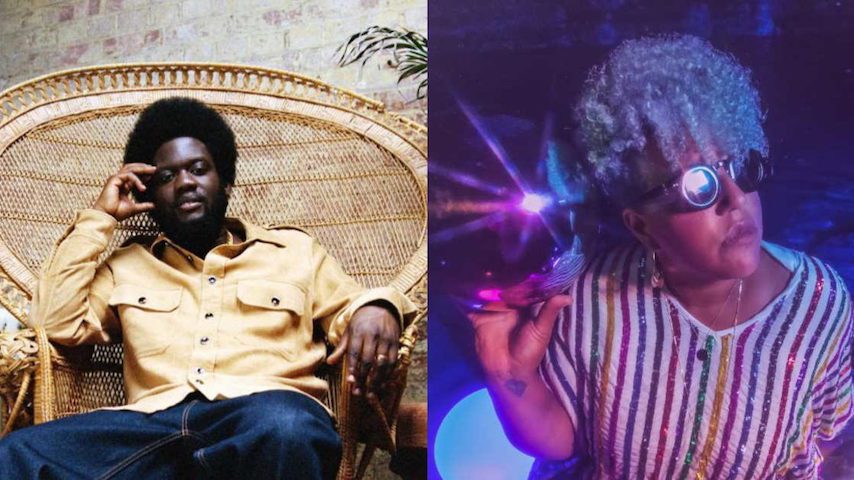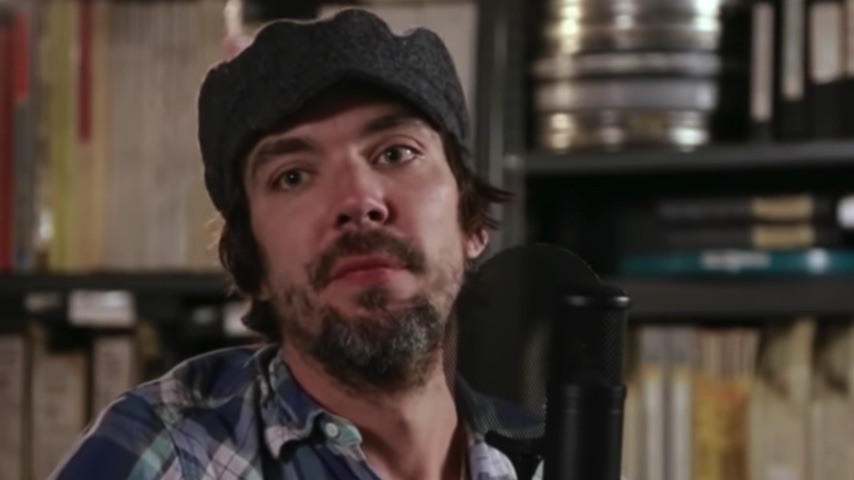When hard-working tunesmith Aimee Mann got the news that she’d won a 2018 Grammy Award for Best Folk Album, she wasn’t clinking cocktails in the tony, star-studded crowd at New York’s Madison Square Garden. She was doing what she always does—logging another in a long line of wit-embellished concerts, this time at Cleveland’s Music Box Supper Club. When it was announced that she’d won and the audience congratulated her, she paused long enough for her keen sense of humor to take over: “I went on Twitter, which is always a mistake,” she said from the stage. “The first tweet that I read was, ‘I don’t really like sad, slow, depressing music, and you know, the Cat Stevens record [The Laughing Apple, also nominated] was more my jam. But congratulations.’” She paused, chuckling, before asking the obvious: “Isn’t that kind of a ‘fuck you’?”
The irony was palpable that night. This was Mann’s 13th record and second Grammy win, after flying solo from ‘80s new-wave outfit ’Til Tuesday with her whimsical 1993 debut Whatever. But her first trophy in 2006 was in dubious honor of Best Recording Package for her concept-album artwork on The Forgotten Arm, so she wasn’t holding her breath for a second. Her then-previous set, 2012’s Charmer, featured of her stock in trade, punchy pop-rock, while the dark, dismal Mental Illness worked on several critics like a flavor-erasing palate cleanser. And now, at 61, the Richmond-born, Berklee-educated Mann is proving anything but predictable. Her followup set, Queens of the Summer Hotel (like its predecessors, produced by her longtime collaborator and band bassist Paul Bryan) is a hushed, reverent 15-track song cycle based on the mental-institution memoir Girl, Interrupted, by Susanna Kaysen. Composition titles hint at its sinister side—“You’re Lost,” “Suicide is Murder,” “Burn it Out,” and “Robert Lowell and Sylvia Plath,” to name a few. And “Give Me Fifteen”’s ballroom-chic take on electroshock therapy is positively chilling. But it’s Mann’s warm, chirping delivery that’s most unsettling; you’ll never taste its bitterness because it all goes down with a spoonful of rhetorical sugar.
Sad, slow, depressing music—you don’t like it? Wait for the next album, and you’ll get something completely unexpected. Mann has made a career out of taking sharp U-turns like that, while still following a solid songwriting road map that keeps her out of the ditches. And she might not show up at your next Gala Awards Presentation, either—she’ll be too busy making and/or playing the music that got her invited in the first place. She catches Paste up on those post-Mental Illness years below.
Paste: As I recall, your significant other, Michael Penn, collected rare Knights Templar artifacts. So if you ever had to defend yourself if things got crazy, you’d probably have plenty of old-school weaponry.
Aimee Mann: Well, the swords I feel like are pretty dull, and I don’t think the hats with the plumes are gonna intimidate anybody. I think he has like three swords, but there’s a lot of hats, and there’s some frock coats.
Paste: So how did you guys make it through the pandemic? And where were you—L.A.?
Mann: Los Angeles, yeah. And you know … well, this is kind of a long story, but I got a nervous system disorder, which I probably still have to some degree, which caused these horrible migraines. So I was dizzy and sick the whole time. It was not great. But I’m better now, so hopefully I’ll keep that upward trend going.
Paste: Someone cited you and Michael as an example recently of one of the rock couples with an unspoken rule—you never, ever work together. Like a separation of church and state. Is that true?
Mann: Well, we work together a little bit. But I think the main reason we don’t work together is that we’re both better finishers than starters, so in a writing situation, it’s better to have one person who’s good at generating the initial idea and another person who’s better at finishing it. So I think that’s more why we don’t write songs together. But you know, he’s produced a couple of things for me, and actually during the pandemic, before I got sick, he produced a couple of things. It was a cover of the Leonard Cohen song “Avalanche,” and it was for a TV show—I think it was an HBO show—that was called I’ll Be Gone in the Dark, and I think it was about the Golden State Killer.
Paste: About Patton Oswalt’s late wife, right?
Mann: Yes, exactly. Michelle McNamara. So we did the opening song for that, and that’s a song with a lot of verses, and he did just a magnificent job, because it’s hard to keep that interesting and dramatic when the song structure just repeats. It’s a difficult song, but I feel like Michael did a great job, because he kept it really dramatic and interesting.
Paste: A lot of famous former punks and new wavers are currently diving headlong into the kids’ TV show soundtrack market. And you’ve gotten involved in animation, too, in shows like Steven Universe and Summer Camp Island, right?
Mann: Well, if somebody pays me to do a voiceover, I’ll do it. But that doesn’t happen very often. But if somebody asks me to do a voiceover or to be on their program and do a song or whatever? Hey—if I have time, I tend to do it. All you have to do is call my manager and ask, and I’ll do your voiceover! And I have turned down a couple, but mostly it’s probably things where they wanted to use a song in a theme or something. I think there have been times where I’ve turned things down. So you know, it has to be something that I feel like there’s a reasonable chance that I would actually watch. But I don’t think it happens that much. But Rebecca, the creator of Steven Universe, she’s a songwriter also, and they did a musical version of that, so Ted Leo and I both wrote with her and sang on that. And she’s a really great songwriter, so it’s funny to encounter somebody with such great skill sets in two areas.
Paste: And you and Ted had a podcast going, too?
Mann: I did. But the podcast kind of fell by the wayside, because he was doing all the editing, and I think he just started to get really backed up and just didn’t have the time to do it. And then he had a baby over the pandemic, and that’s definitely a full-time job. So I don’t know if that podcast is gonna come back to life or not.
Paste: How did you cope with your illness? And did you pick up any new hobbies along the way?
Mann: I just read a lot, because part of what the illness did was, it made my nervous system react to any sort of sensory input. Like, I couldn’t really watch TV, and I couldn’t listen to music because it sounded distorted, I couldn’t go on my computer because the blue light from my computer made me sick. So I just read a lot. I read a lot of classics, just some classics that I’d always loved. I read a lot of Fitzgerald, because I love Fitzgerald, and I find his writing very soothing. And we had in the house Ford Madox Ford, Parade’s End, which is really long. And I’d never read that before, so I was like, “Well, now’s the time.” And it’s really good. I wouldn’t necessarily want to read it again, but it’s really good, and a lot more modern than I thought it would be. I read a bunch of Theodore Dreiser, who I really like. And I read … I dunno, just whatever came across my doorstep. I bought a lot of books.
Paste: During lockdown, I discovered Eve Babitz, a contemporary of John Fante. And I’d never seen her most famous photograph, playing chess at age 20 with Marcel Duchamp, but completely nude. Her books on insider Hollywood life were awesome.
Mann: Yeah! I really liked her writing. I think I have all of her books, also. And I like her because she’s a very unapologetically pro-Los Angeles person. And she makes Los Angeles sound really interesting, and she herself was a really interesting person herself.
Paste: So you probably also re-read Susanna Kaysen’s original book, Girl, Interrupted, which I loved a lot more than the movie version.
Mann: I never saw the movie. I think at one point I saw part of it on TV, and it did seem like … there was Angelia Jolie, looking gorgeous. Troubled and gorgeous. But again, the producers who had approached me about writing music for this stage version wanted to keep it strictly from the book—they didn’t want it to refer to the movie. And there were three producers—Barbara Broccoli, who produces all of the Bond films, and her ex-husband Frederick Zollo, who’s done a lot of theatrical productions. And their daughter Angelica got in on this project, and I think this book was a special love of hers. So I think the project really stemmed from her idea about making a musical stage production of this.
Paste: Have you seen it staged yet?
Mann: Well, a couple of years ago there was a workshop, but I’m not really sure—because of the pandemic—what the schedule is, or if there are more workshops scheduled, or what’s happening. But I think also, the writer and director wanted to take it in less of a musical direction, so I figure that I wrote a bunch of songs, and they can use whatever songs they think work. But I’m not super-involved at that point. And I’m not working on my next album yet—I just have to get through this release and do some touring. Well, I hope I can do some touring!
Paste: Given that you didn’t see the film, but you know the book, how do you compose 15 songs for Girl, Interrupted? Do you read a chapter, then pen something compatible?
Mann: I worked with the book and just made notes about things that I felt would make interesting songs. And the parts of the book that I thought needed to be songs, that had sort of an emotional peak. I focused on developing the characters, because I saw that they wanted it to be a full-blown musical, along the lines of A Chorus Line, where each character has a song and tells their story. I mean, I don’t think that they’re doing that, but I wanted them to have the options. And then there were some conversations with the writer and the director about the direction that the show could go in, or certain events that could happen. But I had my own idea of what the arc of the show could be, so that was kind of internal, especially for a lot of feelings that went through the songs.
Paste: How did you see it unfolding?
Mann: You know, I personally like musicals. But at the end of the day, I don’t think that’s what the writer and director really wanted—a full-blown musical with my 15 songs. I think they envisioned it more as a stage play with some music, and I’m not really sure how they picture that happening—I think that’s still in process. But, in all fairness, it is a difficult book because she writes it in this very dry, reporterly way, where she’s observing what the other inmates do. And you don’t really have much information about what her past is—there’s no conversation about her family, what might have happened to her as a kid, what her dynamic with her parents was growing up.
Paste: You yourself dealt with mental illness in your past, right? How did you survive it?
Mann: Well, you know, without getting too super-personal, I think it’s on a continuum. For instance, one of the things that I dealt with in the past was a kind of anxious, obsessive thinking. And I would witness myself having, say, an anxious thought that I kept ruminating on. And then I sort of had a moment where I felt like, “I’m not even thinking this thought—it’s happening on its own, and it’s going around and around in my head. And I don’t seem to be able to stop it.” And listen—I’m sure some people have that thought, or are completely taken up by it, and don’t observe it, don’t have any ability to observe it from the outside. But I could see that this was getting to a point where it was beyond my control, and it wasn’t a normal way of thinking. And that led me to get help, because I knew that wasn’t normal.
Paste: I got prescribed a Parkinson’s medication recently called Mirapex, which was worse than what it was supposed to cure. It turned me into an OCD werewolf, and I could recognize my behavior as aberrant, like compulsively eating sugar when you’re diabetic, but I simply couldn’t stop. By the time I finally got off of it after two years of hell, I had lost over 100 pounds and it had nearly killed me.
Mann: I have heard of this—that there are medications for Parkinson’s that cause really obsessive-compulsive behavior. It’s really scary, medication. I had an experience with Nortriptalyn—it’s one of the medications I was prescribed, and it made me absolutely psychotic. I mean, I went completely crazy—I was screaming and throwing stuff. I had a conversation with my friend and started screaming, and I was on the phone and threw the phone. And I was like, “Hold on—maybe I should read the literature for this medication,” because it was so erratic. And you feel like it’s coming from you. It doesn’t feel like it’s coming from something else. It was terrifying. You’re just doing what you’re doing [on the drug], but then there’s a glimmer of like, “This isn’t right.” I was aware just enough to read the literature, in case maybe this medication had something to do with it.
Paste: What ultimate lessons have you learned from the pandemic? Has it changed your work ethic in any way?
Mann: Well, I didn’t work. I couldn’t work at all. But I think sometimes you just have to accept, “Well, this is the way it is right now.” And I think the message I came away with is more optimistic—that you never know what unexpected health is around the corner. You never know. Because I feel okay today, and one reason being that there’s a doctor who prescribed this peptide that they use in Europe, for stroke patients and traumatic brain injury patients. And that really helped me. And another thing that helped was, I came across an app that has these behavioral exercises for chronic pain. Because you can go through a lot of these symptoms, but there are exercises you can do—it’s called Curable, if you’re interested.
Paste: And if all else fails, there’s one bright, shining music news that can’t help but brighten your day: ABBA’s back, with a great new feel-good pop panacea called Voyage. As if on cue.
Mann: Great! And you know what? I’m in the mood for that—I can’t wait!
Queens of the Summer Hotel is out now on SuperEgo Records. Listen here.




